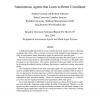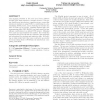1734 search results - page 153 / 347 » What works |
CSCW
2012
ACM
12 years 6 months ago
2012
ACM
We report on a study of the English edition of Wikipedia in which we used a mixed methods approach to understand how nested organizational structures called WikiProjects support c...
AAMAS
2004
Springer
13 years 10 months ago
2004
Springer
A fundamental difficulty faced by groups of agents that work together is how to efficiently coordinate their efforts. This coordination problem is both ubiquitous and challenging,...
DESRIST
2009
Springer
14 years 3 months ago
2009
Springer
Innovations in health care are often characterized by complexity and fuzzy boundaries, involving both the elements of the innovation and the organizational structure required for ...
SIGCSE
2009
ACM
14 years 11 months ago
2009
ACM
Can engaging students in free and open source software (FOSS) pique their interest in computer science? This paper describes an introductory computer science course that introduce...
ICDM
2005
IEEE
14 years 4 months ago
2005
IEEE
Adaptive clustering uses external feedback to improve cluster quality; past experience serves to speed up execution time. An adaptive clustering environment is proposed that uses ...


